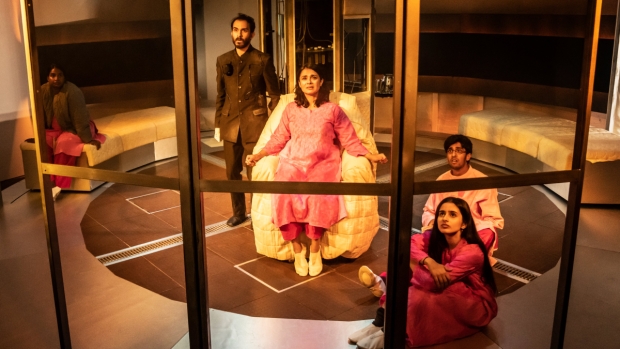”The Cherry Orchard”, a sci-fi adaptation by Vinay Patel, at the Yard Theatre – review

© Johan Persson
I’ll be honest: I had to check the date to make sure it wasn’t April 1st when I first read about this co-production between The Yard, English Touring Theatre and HOME Manchester. I mean, a version of Chekhov’s classic play but set on an interplanetary craft hurtling through outer space, and staged by a director (James Macdonald) with enough Royal Court, National Theatre and West End credits to choke a cart horse…surely this had to be a wind-up, yes?
Well, actually, no. In fact, playwright Vinay Patel’s “re-imagining”, bizarre as it is, proves surprisingly successful at getting to the tragic comedy at the heart of Chekhov’s masterpiece. Patel also finds some inventive solutions to the challenge of transforming a story about seismic social change in a country on the brink of revolution into a playful futuristic comedy thriller in which the sole surviving humans are space-travelling South Asians. Majestic but impractical, land-owning aristocrat Ranevskaya becomes beguiling but out-of-touch starship Captain Prema Ramesh, newly returned to the ship with daughter Anju (Anya in the Chekhov piece) from a reconnaissance shuttle mission to view a black hole, as you do, and on the lookout for a planet to settle the remainder of humanity upon.
The debtors and rebellious serfs that underpin the end of Ranevskaya’s life of opulent privilege here become “the downdeckers”, lowlier crew members determined to escape from the ship to a habitable nearby planet. The sense of old world structures crumbling to make way for brighter, more egalitarian possibilities retains some potency when couched in terms of downtrodden idealists newly commandeering a fragile, outmoded vessel whose systems are starting to fail. Macdonald’s production suggests a very real sense of impending dread but also of the ennui of lives endlessly closeted together as the ship sails inexorably on.
A particular master stroke is turning ancient manservant Firs (here renamed Feroze, played with a fascinating mixture of dead-eyed automation and desperate melancholy by Hari Mackinnon) into a malfunctioning robot winding down at an alarming rate while still trying to appear useful. The commitment by creatives and cast to the overriding concept can’t be faulted, even if ultimately it doesn’t truly illuminate the original Chekhov in any significant or revelatory way. It’s enjoyable and reasonably interesting, but it simply feels like dressing.
Furthermore, I’m not sure if it’s budgetary constraints or the idea that the spaceship is on its last legs, but there’s a slight whiff of cult TV series Blakes Seven at its tackiest about Rosie Elnile’s perpetually revolving set. Audibility is sometimes an issue too, with the constant machine-like thrum of Max Pappenheim’s sound design occasionally drowning out the naturalistic line deliveries.
Several of the cast would acquit themselves equally well in a more conventional version of The Cherry Orchard: Anjali Jay is an uncharacteristically youthful Ranevskaya/Ramesh but exquisitely captures her combination of imperiousness, vulnerability and charisma, and Aaron Gill is poignantly funny as the absurd, lovelorn Sailesh (Yepikhodov to Chekhov enthusiasts). Samar Khan’s fresh-faced Anju, tougher than she first appears, is thoroughly convincing. By combining the two roles of Ranevskaya’s spikily unhappy adopted daughter Varya and the eccentric, card-trick-performing governess Charlotte into one, Patel has created a peach of a part. Tripti Tripuraneni invests this Varsha with sardonic wit and a sorrowful watchfulness that is extremely affecting and is a quietly magnetic presence throughout.
This unconventional take on The Cherry Orchard may not necessarily add anything to our comprehension of the original but neither does it ever tip over into the unintentionally funny, which it looked, on paper, as though it might. In fact, it’s the contention that, for all their existential angst, Chekhov’s plays are essentially comedies, that is most persuasively demonstrated here. But this is comedy with a heart, a keen intellect, and a lump in its throat. Highly original if not revelatory.












